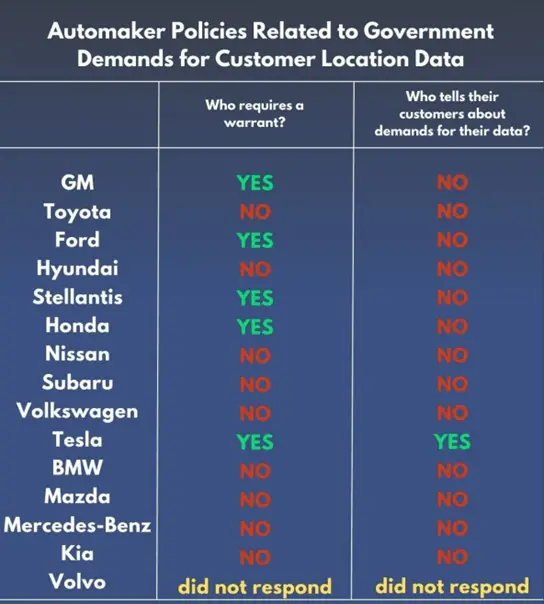Privacy Betrayed: Automakers Share Location Data Without Warrants
The U.S. Congress has disclosed the findings of an investigation, which reveals that the majority of major automakers transmit driver location data to law enforcement without a court order, despite public assurances to refrain from such actions.
Of the 14 automakers surveyed, only five (GM, Ford, Honda, Stellantis, and Tesla) require a court order or judicial decision to provide such information, and only Tesla notifies customers of law enforcement requests.

In response to a query from senators, submitted through an unspecified automotive industry association, Volvo did not provide information. Industrial giants Toyota, Nissan, Subaru, Volkswagen, BMW, Mazda, Mercedes-Benz, and Kia acknowledged that only a judicial subpoena, which does not require judge approval, is necessary to transfer data.
Volkswagen stated that it requires an order to disclose location data for periods longer than 7 days, but will reveal information for 6 days or less based on a subpoena. Volvo, owned by China’s Geely, offered no comment.
Senators Ron Wyden and Edward J. Markey, who are actively addressing the issue, have written to the Federal Trade Commission (FTC) demanding an investigation into the misleading statements and data retention practices of automakers. According to the senators, automakers ” not only kept consumers in the dark regarding their actual practices, but multiple companies misled
consumers for over a decade by failing to honor the industry’s own voluntary privacy principles,” as noted in the letter. The industry organization Alliance for Automotive Innovation emphasized automakers’ commitment to protecting sensitive vehicle location data.
Nevertheless, according to Wyden, the data was obtained directly from automakers, casting doubt on the transparency of their statements. The association’s press secretary did not respond to a request for comment.
Mercedes-Benz assures that the company “does not engage in the systematic collection of historical vehicle location data,” while Hyundai acknowledges that it “typically” retains such data for up to 15 years, Toyota for up to 10 years, and Honda for up to 7 years.
Vehicle location data can reveal intimate aspects of a person’s life, including visits to various medical facilities and participation in protests, thus posing a risk to citizens’ rights and freedoms.





